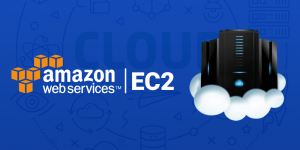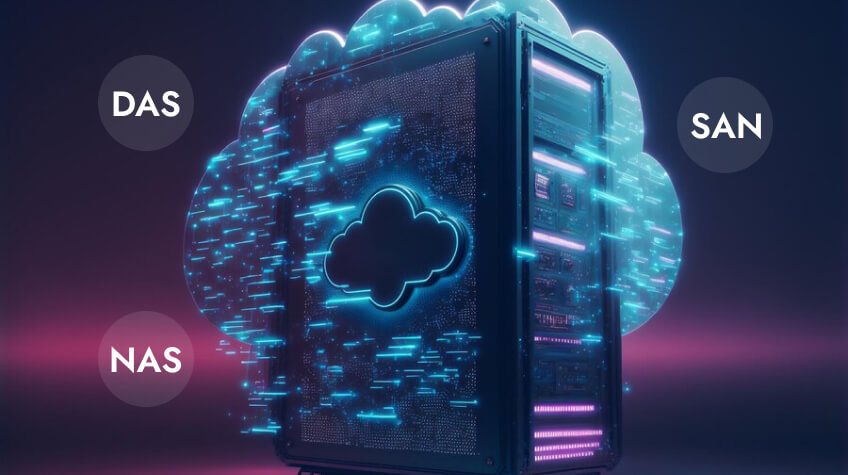
Data is a crucial element in running a successful business today. No matter what the size of your business is – DATA is crucial. More than that, every business owner should have proper data storage solutions in place to retain, manage, and preserve digital information. There are numerous ways you can store data. In this post, we will share with you some of the most popular and effective data storage solutions. So, without any further ado, let’s get straight to the point. Here we go…
Table of Contents
What is Data Storage?
Data storage refers to the process of storing data in a secure manner. This involves using various devices and media to retain, manage, and preserve digital information. Data is the lifeline of any business. Almost every business today relies on digital information. Keeping this information safe from cyber criminals and easily accessible to users is crucial for a company in this digital era. Having robust data storage methods in place is critical for any organization’s success. Data storage enables the saving, retrieval, and management of data for personal, business, and enterprise use. You can save any kind of data, from simple text documents to complex databases and multimedia files, using data storage solutions. Using efficient and reliable data storage solutions is critical for ensuring data accessibility, availability, and security. Let’s now take a look at different types of Data Storage. Here we go…
Types of Data Storage
There are numerous data storage solutions available out there each serving different purposes and offering distinct features. However, the main ones are listed here. Take a look…
1. Direct-Attached Storage – DAS
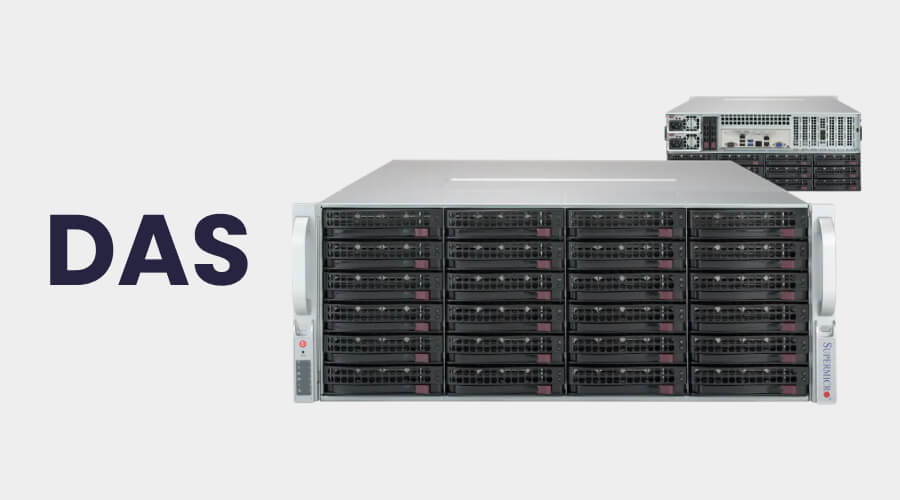
Direct-Attached Storage, popularly known as DAS, is a renowned method of storing data. DAS, as the name says, is a storage device that is directly connected to a computer or server. This type of data storage can be connected to a single device, either internally or externally.
Upsides of DAS Devices
- DAS devices are incredibly user-friendly devices.
- These storage systems require minimal effort to set up and maintain.
- They allow for easy setup and configuration.
- DAS offers quick access to data as these devices are attached to the computer that is requesting and using the data.
Downsides of DAS Systems
- DAS systems can be vulnerable for organizations as they are attached to single devices.
- These systems lack scalability.
- These storage types offer limited sharing options.
Ideal for: Small-sized organizations, startups, and businesses.
2. Network-Attached Storage – NAS
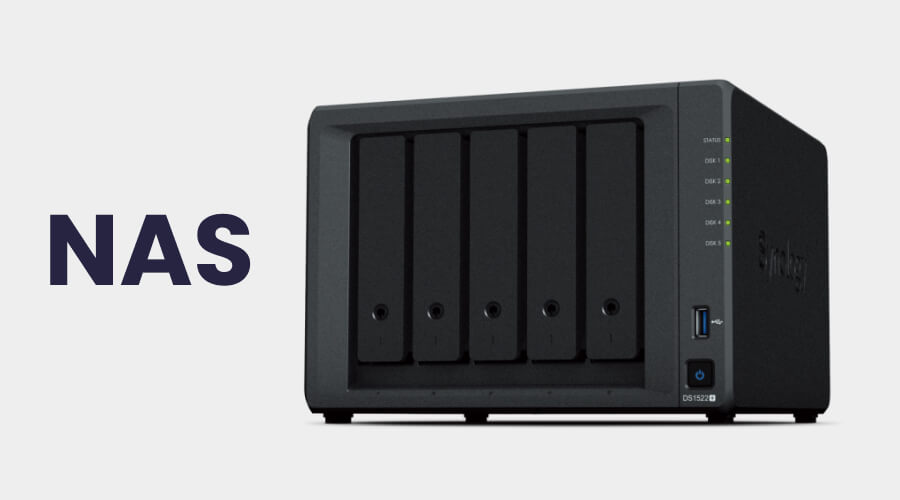
The next very popular data storage system is Network-Attached Storage, also known as NAS. NAS is a storage server. It is specifically designed to connect to devices through a LAN. NAS server allows multiple external devices to easily retrieve and store data. The device utilizes a file-storage system and employs clustering or a redundant array of discs (RAID). Moreover, this system offers extensive sharing capabilities because of its network connection.
Upsides of NAS Server
NAS offers numerous advantages, such as:
- It offers extensive sharing capabilities thanks to its network connection.
- It is an open-source solution.
- These systems are highly scalable.
- NAS servers are secure.
- It allows for the installation of a reliable operating system and the implementation of various solutions like Samba, NFS, or FTP to create a NAS.
Downsides of NAS Storage
- Setting up and maintaining these storage systems can be pretty challenging.
- Performance is affected by the network it is connected to. Highly congested networks generally lead to degraded performance.
- Limitation in the LAN bandwidth for data transfers.
Ideal for: These storage types are ideal for enterprise-level workloads and backups.
3. Storage Area Network – SAN
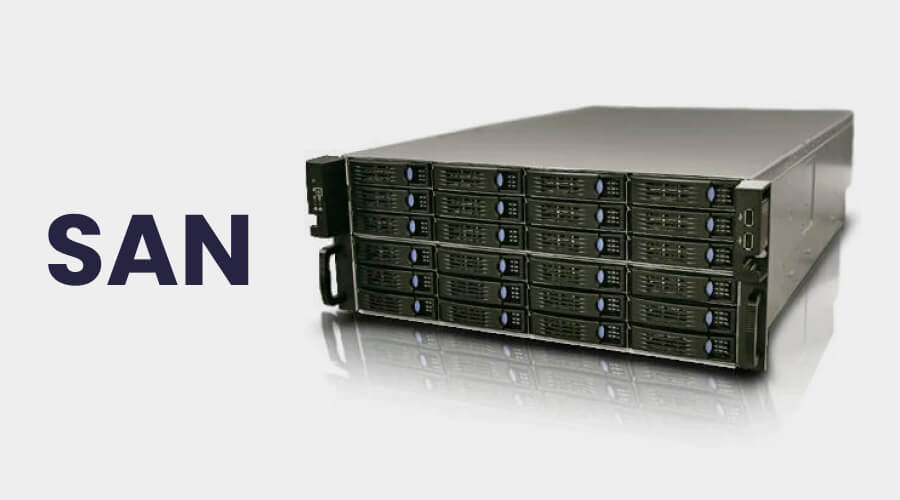
Next type of data storage is Storage Area Network, also known as SAN. SAN is also a network-based storage. This specialised storage network connects to servers. It provides block-level access. This storage type is particularly a blend of NAS and DAS. It consists of several data storage devices connected through a network. It utilises different networking protocols, like Fibre Channel, to efficiently transfer data between a server and Storage.
Upsides of SAN Storage
- SAN devices enhance data accessibility.
- It provides centralized storage that is accessible to multiple servers simultaneously.
- This storage system allows users to retrieve data quickly and efficiently.
- It helps streamline business operations.
Downsides of SAN Storage
- Setting up a SAN can be challenging as these systems are only set up by experts.
- Specialized network and storage devices need regular upkeep.
- SANs are costly endeavours. They need regular upkeep and management, which adds to the overall cost.
Ideal for: SANs are considered ideal for data that require low-latency access and high-speed data transfer, such as database management and virtualization or video editing
Also Read: Database and Data Warehouse: Which Data System is better
Last Few Words
So, this is all about data storage and its various types. Know that data storage is a critical component of the digital world. Understanding the different data storage types and their uses can help individuals and organizations make informed decisions about managing their digital information effectively. Also, it is critical to know that these systems or types keep evolving with technological developments. Hence, it is critical to stay abreast of the developments in data storage solutions so as to ensure the best data management at all times.
Let’s now take a look at some frequently asked questions pertaining to Data Storage. Here we go…
FAQs
Q1. What is Data Storage?
Data storage refers to the process of storing data using different systems or methods. Data storage requires devices and media to retain digital information.
Q2. What kind of data can we store?
Well, any data that is crucial for you or your organization can be stored in data storage systems. You can choose to store any kind of data using these storage systems, from simple text documents and images to complex databases and multimedia files in data storage devices.
Q3. What is NAS storage, and how does it work?
NAS stands for Network Attached Storage. It is a dedicated data storage system that offers centralized data storage and access to multiple devices over a network. Unlike DAS, NAS devices can be connected to multiple external devices. It connects devices through LAN. These systems contain multiple hard drives arranged in a RAID (Redundant Array of Independent Disks) configuration to ensure data redundancy and reliability. The device operates with its own operating system, managing storage allocation, file sharing, and security.
Users can access NAS devices through standard network protocols like NFS (Network File System) or SMB (Server Message Block). NAS storage is considered best for businesses, and enterprises looking for an effective and secure method to store, organize, manage, back up, and share data across various devices and locations.
Q4. How do I choose the right data storage solution for my needs?
Choosing the right data storage solution primarily depends on the amount of data that you need to store. For instance, if you are individual running your own business, you can opt for a DAS storage. On the other hand, for an enterprise-level data storage, a NAS system is considered the best. In addition, the type of data storage you choose will be dictated by your budget, as different types of Storage incur different charges.
Q5. What does a typical storage area network include?
A SAN Storage includes, Fabric Switch, FC Controllers, and JBOD’s. All these are essential components for SAN storage.
Q6. Why is storing data crucial?
Data is something that keeps increasing with time. Moreover, advanced technologies like data analytics, the internet-of-things, and AI utilize amounts of data to perform better. Storing data not only makes data management a breeze but also helps users to have easy access to their digital information. Having robust data storage can help you organize, manage, access, share, and utilize digital information without any hassle.
In addition, data storage enables the convenient accumulation and retention of vast amounts of information for a long time. These systems allow you to access data using any device, from your computer to your mobile. Moreover, they also help with efficient data recovery in case of data theft or when you lose it accidentally. Digital data storage systems are easy to maintain and manage. Data storage systems allow users to access and share digital information across several devices easily. Lastly, these systems safeguard your data from cyber criminals and crooks.




